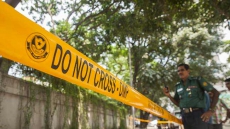Fourteen Nepalese providing security to the Canadian embassy here were killed when a suicide bomber targeted their mini bus in the Afghan capital on Monday, authorities said.
The suicide bomber approached the bus in Banahi area along Pul-e-Charkhi road which is also called Jalalabad road at around 5.40 a.m., killing the 14, Xinhua news agency quoted the interior ministry as saying.
Five Nepalese and four Afghans were wounded in the attack.
The attacker too was killed on the spot and the blast also damaged several civilian vehicles and shops nearby.
Both the Islamic State terrorist group and the Taliban claimed responsibility for the bloodbath.
Zabiullah Mujahid, a purported Taliban spokesman, said over 20 people were killed or wounded in the attack. It said its "fighters" carried out the operation.
The killings drew swift condemnation in Afghanistan, Nepal, India and Pakistan.
The Afghan government's Chief Executive Abdullah Abdullah said: "I condemn the terrorist attack on those travelling to their work places in Kabul. This attack is an act of terror and intimidation."
Indian Prime Minister Narendra Modi "strongly condemned the horrible tragedy" and offered "deep condolences" to the governments and people of Afghanistan and Nepal.
Nepal reacted with grief and shock.
Prime Minister K.P. Sharma Oli said: "I am shocked to hear that 14 Nepalis were killed... I express my heartfelt condolences to their kin."
He wished early recovery to those injured in the horrific incident.
Nepal has no embassy in Afghanistan. Its mission in Islamabad oversees the Afghan affairs.
The Nato-led Resolute Support Mission said: “The Taliban’s actions repeatedly harm civilians in an effort to undermine the government..."
The Taliban-led insurgency has been rampant since early April when the group launched its annual offensive in different places, claiming hundreds of lives including militants, security personnel and civilians.
The Taliban has urged civilians to stay away from official gatherings, military convoys and centers regarded as legitimate targets by militants besides warning people not to support the government.
The Taliban has waged an insurgency since 2001. Nato ended its combat mission in December 2014 though some 13,000 training and counter-terrorism troops remain in Afghanistan.
Peace efforts have stalled after the Taliban refused to participate in new talks with Kabul until foreign forces leave the country.




